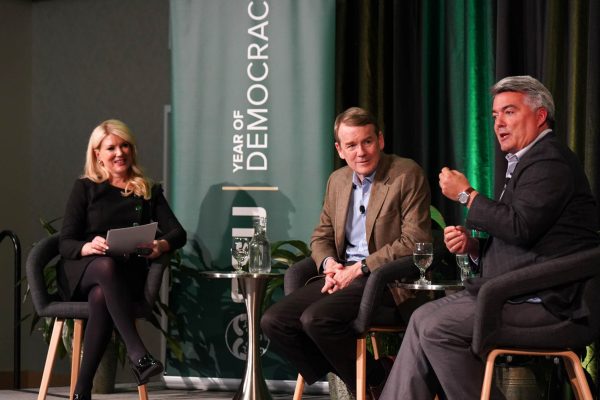Students witnessed a powerful collision between activism and intellect during a panel discussion about gender and democracy.
On March 4, members of the Colorado State University political science department led a panel discussion on the intricate relationship between gender and democracy in the Lory Student Center.
Ad
The event was significant because it coincided with both the university’s thematic Year of Democracy and International Women’s Week.
Gamze Çavdar, an associate professor of political science, took on the role of the moderator for the discussion. In her opening remarks, she highlighted the importance of recognizing the intersection of democracy and gender, especially during a week dedicated to recognizing women’s achievements as well as their struggles.
“I want to highlight that (it) is not only the outcome of women earning less in those fields, but it is also the consequence of the message that is translated that women’s work is not valued as much as men’s work.” –Sarah Haneke, political science student
One of the panelists, political science Professor Courtenay Daum, highlighted the disparity in political representation between men and women.
“Women continue to be underrepresented in Congress, in state houses, in the federal judiciary, in the state judiciary (and) in Fortune 500 company leadership,” Daum said.
Daum advocated for increased civic engagement among women, stressing the importance of voting, grassroots mobilization and volunteering as avenues for political empowerment.
Sarah Haneke, a political science student at CSU, shed light on concerns facing her generation such as the gender wage gap and financial inequality. She said women still earn 16% less than men in the same job; however, financial equality is not expected until 2056.
“I want to highlight that (it) is not only the outcome of women earning less in those fields, but it is also the consequence of the message that is translated that women’s work is not valued as much as men’s work,” Haneke said.
Haneke also emphasized the importance of addressing reproductive rights and LGBTQIA+ issues and enhancing women’s representation in positions of power, all of which are crucial aspects of achieving gender equality.
Sue Doe, executive director of The Institute for Learning and Teaching and a professor in the English department at CSU, introduced a tool aimed at evaluating gender inclusivity in the classroom. The tool, which encompasses various dimensions of justice, including linguistic, epistemic and racial justice, seeks to foster equitable learning environments.
Ad
Doe encouraged students to utilize this tool to assess their classrooms and engage with professors to promote inclusivity and diversity.
Pinar Omur-Ozbek, associate professor of civil and environmental engineering, shared her personal journey in STEM and highlighted the challenges women face due to cultural expectations and implicit biases. Drawing from her mother’s experiences as a chemical engineer, she emphasized the need for mentorship and support to overcome systemic barriers.
Omur-Ozbek highlighted leveraging democracy to advance equity and inclusion by focusing on the importance of equal opportunities for all individuals.
“Because of our lack of representation, we do lack mentors, we do lack (role) models who would inspire us to pursue these areas and fields,” Omur-Ozbek said.
One male participant questioned the role of men in discussions such as these. Daum responded by stressing individual responsibility in fostering inclusivity and encouraging proactive engagement from all members of the community.
Grace Sjaastad, a political science and Spanish student, expressed her disappointment in the lack of male participation.
“We might all be women, but we know men,” Sjaastad said. “We could maybe carry these conversations to the men we know, but I feel like that loses a little effectiveness, too. Why can’t they show up?”
Reach Kloe Brill at life@collegian.com or on Twitter @CSUCollegian.
























